Aghori: Corpse eaters who have conquered fear in themselves
Categories: Asia
By Pictolic https://pictolic.com/article/aghori-corpse-eaters-who-have-conquered-fear-in-themselves.htmlIt's amazing, but there are still places on our planet where holiness is not an empty phrase, and in order to achieve it, people take the path of extreme asceticism. One of these places is India, where several civilizations and epochs are intertwined, as well as dozens of different religions, both universally recognized and completely exotic for us.
Aghori, a small and perhaps the most difficult sect for us to understand, is an excellent example of how progress and ancient gloomy rites of death can get along in our world.
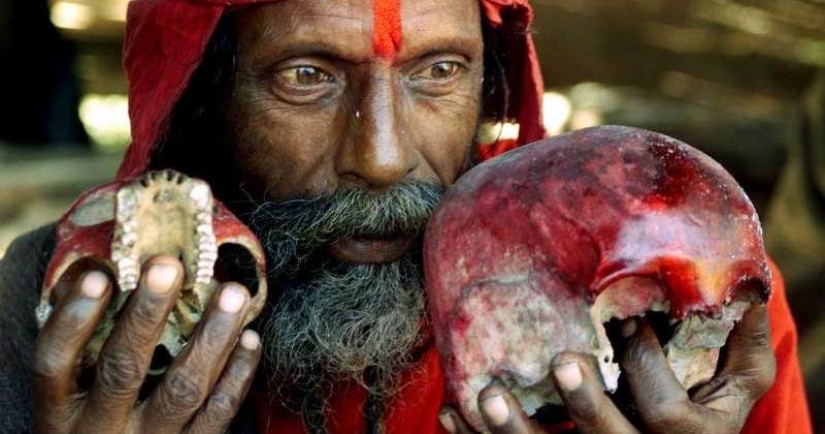
Being followers of the Conqueror of Death, Lord Shiva, Aghori try to imitate their patron in everything. The favorite place of the God-Destroyer are battlefields, cremation grounds and cemeteries, his neck is decorated with human skulls, and he himself is constantly under the influence of drugs and alcohol.
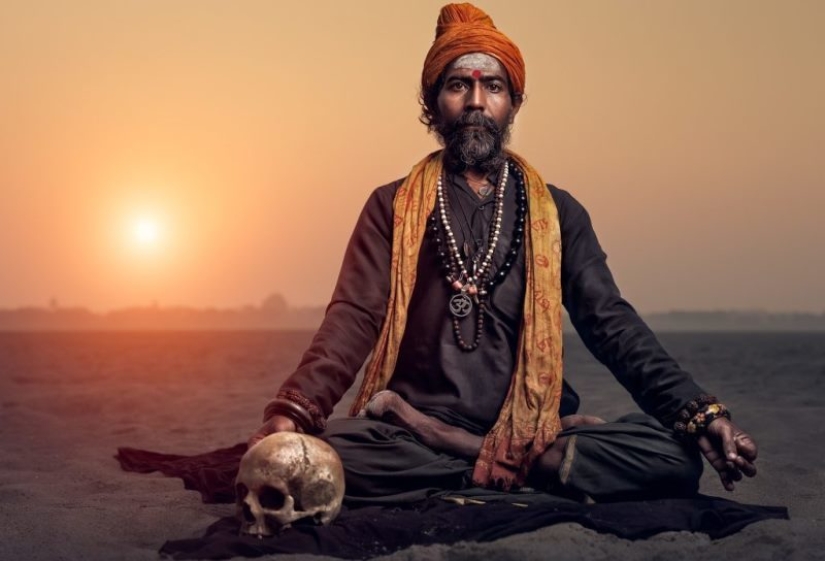
Shiva behaves like a madman, and the Aghori try to conform to these questionable divine principles for us. Almost all their lives, after accepting Shiva as the main god, these sadhus (saints) spend in the nude or with a minimum of clothing. Their faces and bodies are covered with ashes of funeral pyres and sewage, and all their possessions fit in their hands.
Many Aghori infringe on the flesh by wrapping body parts and genitals with ropes and chains, making barbaric punctures and inhumane artisanal body modifications. Everything is allowed by these sadhus. Followers of Shiva despise all the conventions and prohibitions of Hinduism — they use alcohol and narcotic substances, eat meat, do not disdain connections with prostitutes and constantly swear.
But all these sacred qualities, the owners of which can be found near any entrance without going to the banks of the Ganges, seem to be pampering next to the relationship of these strange ascetics to death and the dead. For an ordinary person, corpses and objects associated with death, decay and decomposition are considered unclean and, often, even talking about them is taboo.
In Europe, the Americas and many Asian countries, it is customary to avoid not only the dead, but also everything that is somehow connected with them. For centuries, executioners, undertakers and gravediggers have suffered from this in the countries of developed Christianity, victorious Islam and even Buddhism, which denies everything and everything. But these superstitions absolutely do not concern the Aghori, in whose vocabulary the words "disgusting" and "unfavorable" are absent at all.
The traditions practiced among the Aghori can shock the most passionate fan of horror films. The adherents of this sect eat the meat of corpses, both raw and charred on funeral pyres, meditate sitting on the half-decomposed dead and even engage in ritual sexual intercourse with the dead. The fact that the elders do not disdain to eat human and dog excrement, you can not even mention.
The word aghori can be translated from Hindi as "not knowing horror". This is a very precise definition, since the practice of this religious and philosophical trend is aimed at complete fusion with fear. The fear of death is the strongest of all, therefore, in order to defeat it, the Aghori intermarried with the "noseless", letting her into your daily life.
This is how a certain ritual of this sect is described in fiction. But this passage, most likely, has a very remote relation to realities that are so terrible that they cannot be understood by the uninitiated.
Aghori's favorite place where they can always be found is Varanasi, the sacred city of Hindus. Located on the banks of the Ganges River, it is the Indian equivalent of Muslim Mecca or Christian Jerusalem. Every year, this city, located in the northeastern state of Uttar Pradesh, is visited by millions of pilgrims from around the world.
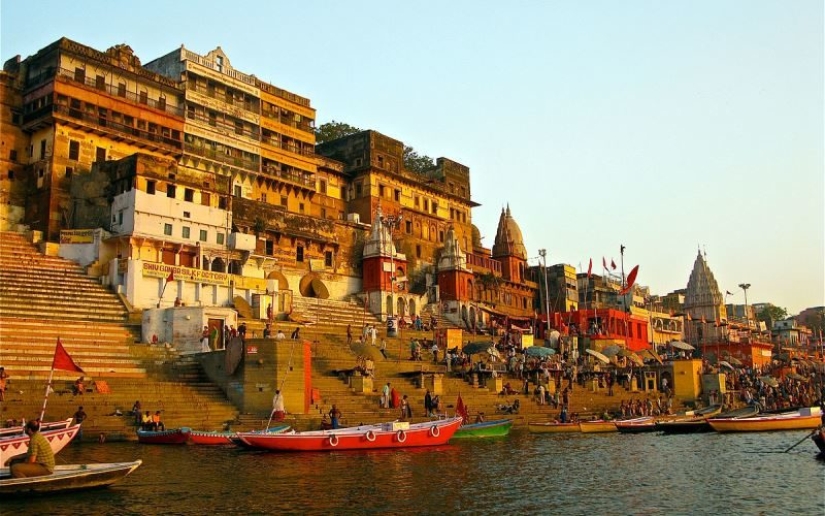
According to legend, the city was founded by Shiva himself 5000 years ago and therefore Aghori feel as comfortable as possible here. But a very dubious historical fact is not the only reason for the love of creepy sectarians for this place. Varanasi is a place of ritual burial, to which dead bodies are brought for cremation from all over India.
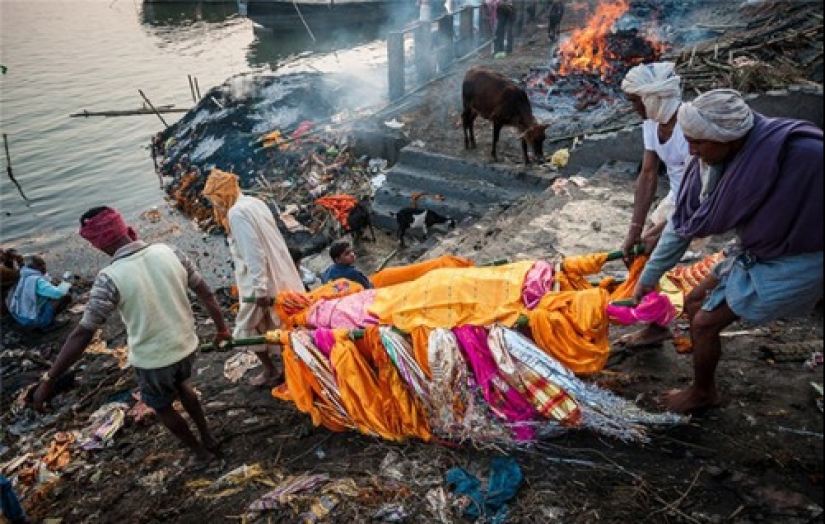
On the ghats, the wide stone steps of the embankment descending to the Ganges water, the religious life of the city's residents and pilgrims is concentrated. The water of the river, according to Hindus, is able to purify both the living and the dead from contamination. That is why the ghats perform cleansing rituals with ablution, bathe, wash and ... cremate the dead.
It is on the steps intended for making bonfires that one can meet adherents of the terrible Shiva - aghori. These people are considered saints, but they are still afraid and shunned.
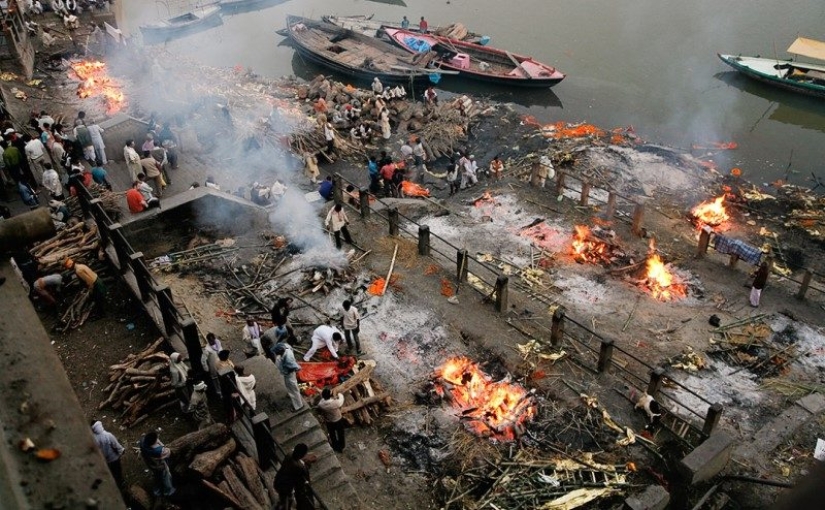
Dislike of the corpse-eating ascetics is connected not only with their rituals, diet and appearance. It is believed that any ominous prediction that has flown from their lips will certainly come true. Residents and guests of Varanasi do not tempt fate, so they avoid unpleasant, smelly and foul-mouthed people, who are also almost always drunk.
The Aghori themselves treat living people neutrally, without showing hostility, and even love foreign tourists. Cannibals willingly take photos with guests and accept gifts and cash donations from their hands.
Despite the hospitality of the hosts who want to stay overnight in the Aghori camp, among charred skulls and gnawed shin bones, it is usually not found even among extreme people. However, there are rumors that anyone can take Shiva into his heart and become an aghori, but there are very few people who want to join the sect.
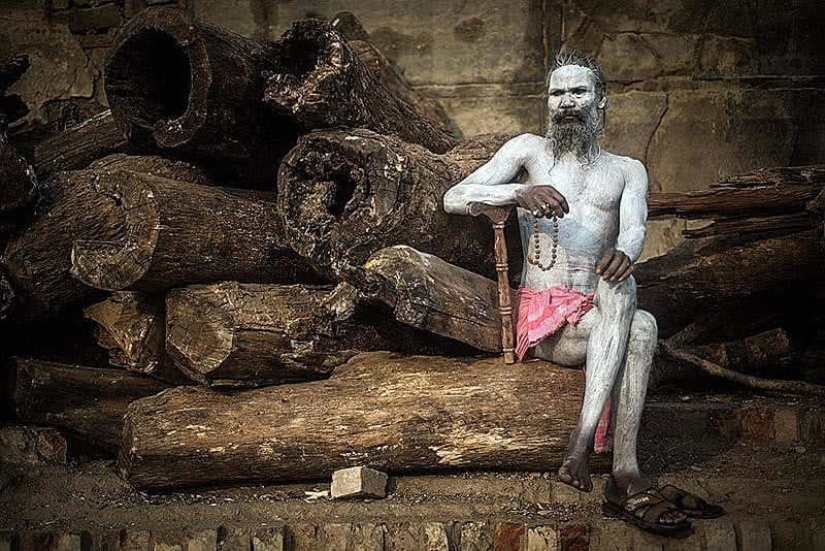
As we have already said, the whole life of aghori revolves around death and remains. In Hinduism, very complex funeral rites are practiced, which have not changed for thousands of years. Fire burial is the most honorable and expensive way of burial. In Varanasi itself, there has been no wood suitable for bonfires for many centuries, so firewood for funerals is brought with them or bought from merchants on the spot.
To perform the ritual, you need at least 500 kg of dry firewood, and the process takes about 4 hours. At the same time, a complete cremation is not required from the body — the ceremony is recognized as accomplished when the skull bursts from high temperature. It is believed that at this moment the purified soul leaves the body, and the relatives of the deceased feel that they have fulfilled their duty to the end. The charred remains are thrown into the waters of the Ganges, and some parts of the corpses become prey to the Aghori.
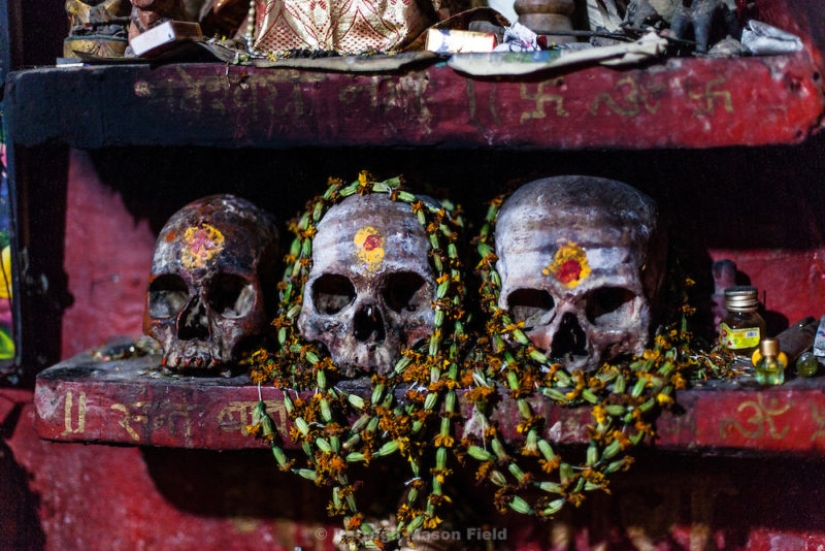
Cannibals especially appreciate the brain from the skull that has just burst from the heat of the fire - such food is pleasing to Shiva and is a delicacy for corpse-eaters. During the day, up to 300 bodies are burned at the fires of Varanasi, so the sectarians do not feel a shortage of sacred objects and ritual food.
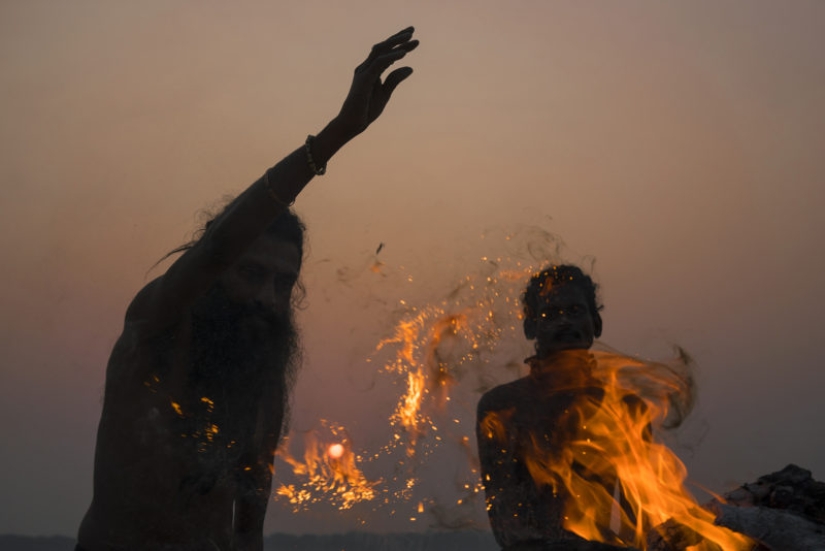
The behavior of Aghori is considered quite normal among Hindus, and cannibals peacefully coexist with ordinary people. For more than three thousand years of the sect's existence, an attempt to eradicate it was made only once, during the period when India was a British colony. The British in the XIX century zealously set about eradicating the terrible phenomena in Indian society and even succeeded in some things.
The thugs, a sect of stranglers who worshipped the bloodthirsty goddess Kali, were completely destroyed, and "sati", the practice of burning alive wives with dead husbands, was abolished. But the powerful British machine could not grind aghori — the ascetics were not afraid of death and pain, and even the most brutal demonstrative executions were perceived as nothing more than a street performance.
It would seem that everything human is alien to Aghori, and nothing positive can be expected from these people. However, it's hard to believe, but the cannibal community is engaged in charity! Material values of aghori are despised, and all gifts received from tourists and funeral participants are given to a clinic for leprosy patients. These donations are not episodic — the leprosarium has existed for many years only thanks to the servants of Shiva.
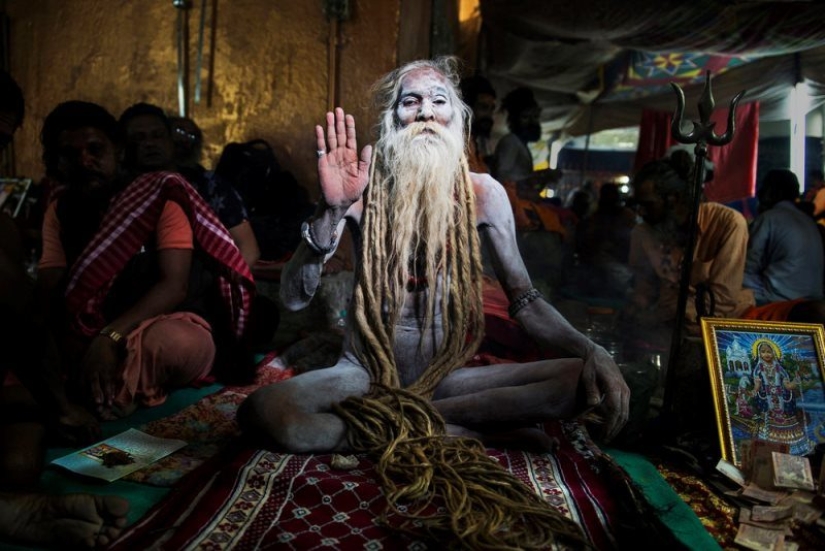
India is an unusual country in all respects, and the attitude of the authorities towards cannibals proves this once again. Despite the fact that cannibalism is punishable by law in the country, the police turn a blind eye to the Aghori weekdays, and they do not exert any pressure on the adherents of the sect. Perhaps it is this kind of loyalty that makes it possible for thousands of years to maintain a relative balance of good and evil in a country where both the first and the second have been in abundance for centuries.
Keywords: Varanasi | India | Cannibal | Ritual
Post News ArticleRecent articles

It is generally accepted that the Chinese are not very tall people. This is basically true - the average height of men in the ...

When we hear about Judaism and Jews, among many associations, the rejection of pork certainly pops up in our memory. This is not ...
Related articles

Thousands of years ago, Chinese builders built settlements where it was possible to move only by boat. In Europe, you can feel the ...

The most high-flying military parades were held in the early 70s in India. On Independence Day, iron cars in tuning from folk ...

Most scientists believe that people borrowed kisses on the lips from birds. The process of feeding the parents of the chicks from ...

Our world is an amazing place, full of interesting people, places, animals, things and much more. It never ceases to amaze! --> In ...